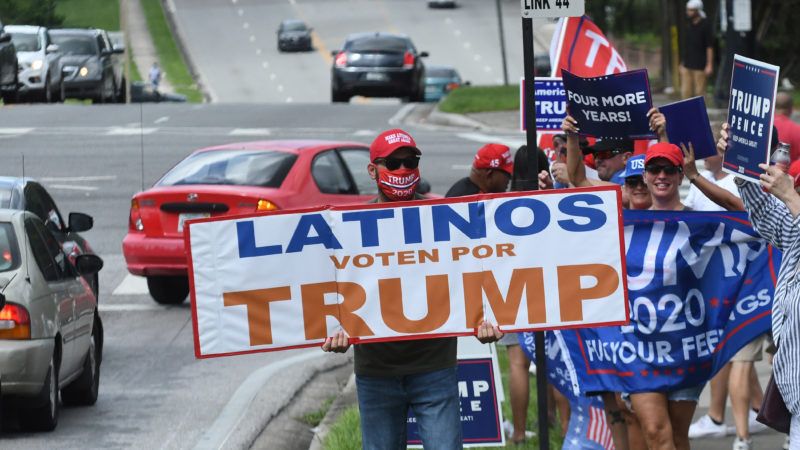Pro-Trump Latinos Now Being Exiled From the Progressive Coalition
Socialism: Not so popular among those who remember it well.

Not only did President Donald Trump win Florida—contrary to the expectations of the perpetually chastened pollsters—but as of Wednesday morning, it looks like he won it by a slightly larger margin than he did in 2016 (51 percent versus 49 percent). This time he had significantly more support from the Latino community: The president improved his raw vote total in the pivotal Miami-Dade County, likely because he captured a larger share of the Cuban American vote.
"Hillary Clinton won the county by a 30-point margin in 2016," notes Vox. "With 86 percent of precincts reporting, Biden's lead had shrunk to just 9 percentage points in Miami-Dade County, and Trump had improved his margins among precincts in the county, where Cubans make up more than a quarter of the electorate by nearly 14 points,"
Trump's messaging to Latinos—and Cubans in particular—appears to have been effective: The campaign heavily targeted Cubans with advertisements suggesting that a vote for Joe Biden was a vote for the kind of socialism that many of them fled when they came to the U.S. Biden has repeatedly and explicitly rejected socialism, though vice presidential pick Kamala Harris—someone whose inclusion on the ticket was supposed to represent outreach to minorities—might have contributed to some mixed-messaging on this issue.
Indeed, very preliminary election results—which must be taken with a grain of salt, as votes are still being counted everywhere—point to the GOP increasing its embarrassingly small share of the minority vote. The specter of pro-Trump Latinos is already prompting recriminations on the left: The New York Times' 1619 Project author Nikole Hannah-Jones referred to Latinos as "a contrived ethnic category that artificially lumps white Cubans with Black Puerto Ricans and Indigenous Guatemalans." Black people, unlike Latinos, experienced chattel slavery in the U.S., and thus "have been forced into a monolithic vote," according to Hannah-Jones. Really, this point just highlights that most ethnic categories are contrived: In fact, Hannah-Jones is essentially saying that one's politics rather than one's skin color is what constitutes whiteness or blackness or brownness. When Biden clumsily said to a black voter, "If you have a problem figuring out whether you're for me or Trump, then you ain't black," he may have inadvertently articulated many intersectional progressives' position: Race is determined by policy views about oppression and marginalization rather than any underlying characteristic.
The project of the activist left has been to bind all oppressed people together in a struggle against racism, sexism, capitalism, transphobia, homophobia, ableism, ageism, sizeism, and every other -ism imaginable. Latinos, in particular, are an example of the inherent contradictions and difficulties of this task: To fight gendered language, highly educated and otherwise privileged college activists have asserted that the gender-neutral term Latinx should replace the traditional Latino and Latina. They have won over many in the media, but very few Latinos—just 2 percent of whom actually like the term.
It appears once again that the combination of woke signaling on cultural issues and far-left economic views that looks attractive to Oberlin College ethnic studies majors is in fact unpopular with a great many minority and immigrant voters. This is something the Democratic Party will need to bear in mind, even if Biden ekes out a win.


Show Comments (114)